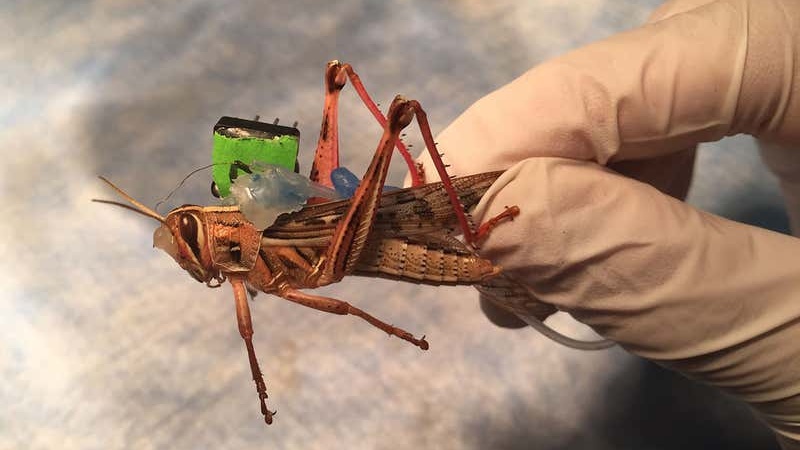Bomb-sniffing grasshoppers: the next frontier for public security?
Scientists ‘hijack’ insects’ brains to detect chemical explosives

A free daily email with the biggest news stories of the day – and the best features from TheWeek.com
You are now subscribed
Your newsletter sign-up was successful
Bomb-sniffing cyborg grasshoppers have been created by scientists to detect explosives such as TNT.
Academics at Washington University in Missouri tapped into the insects’ minds to monitor whether they were smelling explosives, and if so, what kind they were detecting. Or as the researchers put it, the “bio-hacked” grasshoppers play a similar role to a “canary in a coal mine”.
How does the science work?
The Week
Escape your echo chamber. Get the facts behind the news, plus analysis from multiple perspectives.

Sign up for The Week's Free Newsletters
From our morning news briefing to a weekly Good News Newsletter, get the best of The Week delivered directly to your inbox.
From our morning news briefing to a weekly Good News Newsletter, get the best of The Week delivered directly to your inbox.
The scientists essentially “hijack” the insect’s sense of smell, by implanting electrodes into their brains that can pick up electrical signals triggered when olfactory receptor neurons in their antennae detect chemical odours in the air.
The signals are then transmitted wirelessly to the scientists’ computer from a “backpack” attached to the grasshopper, says New Scientist.
This gives the researchers a baseline reading of which parts of the grasshopper’s brain are activated when the insect smells chemical explosives.
When the grasshoppers then smell a new substance, the scientists can compare the new signal reading with the baseline reading.
A free daily email with the biggest news stories of the day – and the best features from TheWeek.com
If the same part of the brain that lit up for smelling chemical explosives subsequently lights up again, the likelihood is that the grasshopper is smelling chemical explosives.
Indeed, the scientists found that the groups of neurones activated by different smells were distinct enough to identify specific sets activated by specific explosives.
A total of seven grasshoppers were tested, and as a unit correctly identified chemical explosives with 80% accuracy.
In a paper outlining their research, the scientists conclude: “Our study provides the first demonstration of how biological olfactory systems [sense of smell] can be hijacked to develop a cyborg chemical sensing approach.”
Why grasshoppers?
Machines engineered to smell out explosives “have limited capacity compared to the broad-spectrum abilities of the biological” sense of smell, say the study authors.
“Despite decades of efforts, these machines do not match the capability of their biological counterparts in terms of range sensitivity and range,” they add.
According to the research paper, the grasshopper was chosen because:
- they are sturdy and can recover from surgeries to implant electrodes
- their olfactory system has been well studied
- they have “non-spiking local neurons in the antennal lobe, therefore, signals from projection neurons alone can be monitored”
- they can be trained to recognise aromas using classical conditioning procedures
- they can carry heavy payloads
- they can function in both solitary and group conditions.
However, the process “was not without harm to the insects”, which as well as having wires attached to their brains, “were also immobilised, meaning they had to be carried into the test chamber on a wheeled remote-controlled platform”, reports The Telegraph.
The grasshoppers could successfully detect explosives for up to seven hours after the electrodes were implanted but then became fatigued and ultimately died.
The project was funded by the US Office of Naval Research, and the researchers believe the grasshoppers could be used for national security purposes.
-
 Switzerland could vote to cap its population
Switzerland could vote to cap its populationUnder the Radar Swiss People’s Party proposes referendum on radical anti-immigration measure to limit residents to 10 million
-
 Political cartoons for February 15
Political cartoons for February 15Cartoons Sunday's political cartoons include political ventriloquism, Europe in the middle, and more
-
 The broken water companies failing England and Wales
The broken water companies failing England and WalesExplainer With rising bills, deteriorating river health and a lack of investment, regulators face an uphill battle to stabilise the industry
-
 The Week Unwrapped: Korean succession, terror by algorithm and German disquiet
The Week Unwrapped: Korean succession, terror by algorithm and German disquietpodcast Could a 10-year-old girl rule North Korea? Will an Isis victim upend web law? And why is Germany upset with its Oscars contender?
-
 The Week Unwrapped: Chinese chips, the Pope in Africa and podcasting
The Week Unwrapped: Chinese chips, the Pope in Africa and podcastingpodcast Is China losing the microchip war? What is the Vatican doing in South Sudan? And has the podcast tide turned?
-
 The Week Unwrapped: Sex and health, the Earth’s core and another new year
The Week Unwrapped: Sex and health, the Earth’s core and another new yearpodcast Is the NHS failing British women? What’s going on at the centre of our planet? And what’s in a date?
-
 The Week Unwrapped: Antisocial Saudis, hormone therapy and retro tech
The Week Unwrapped: Antisocial Saudis, hormone therapy and retro techpodcast Why is Saudi Arabia investing in – and banning – social networks? Will new research make life easier for trans women? And is the future of technology dumb?
-
 The Week Unwrapped: AI in court, Germans in Taiwan and ghostwriters
The Week Unwrapped: AI in court, Germans in Taiwan and ghostwriterspodcast Could artificial intelligence replace lawyers? What does Taiwan want from Germany? And are ghostwriters becoming less ghostly?
-
 The Year Unwrapped: White refugees, Aegean islands and celebrity gossip
The Year Unwrapped: White refugees, Aegean islands and celebrity gossippodcast Was 2022 the year of the white refugees? What’s really going on in the Aegean sea? And why are we so obsessed with showbiz scandals?
-
 The Week Unwrapped: Tracking apps, BTS and stay-at-home girlfriends
The Week Unwrapped: Tracking apps, BTS and stay-at-home girlfriendspodcast Does China’s U-turn mark the end of Covid-tracking apps? Has South Korean pop passed its peak? And are we really seeing the rise of the stay-at-home girlfriend?
-
 The Week Unwrapped: Africa alert, ticket touts and the words of the year
The Week Unwrapped: Africa alert, ticket touts and the words of the yearpodcast Is South Africa at risk of terrorist attacks? Why are ticket touts in such high demand? And are we really in a ‘permacrisis’?